Skolehage som arena for meningsfylt læring og utdanning for bærekraftig utvikling
DOI:
https://doi.org/10.5324/njsteme.v5i1.3950Resumé
Elevers motivasjon for naturfag synker fra elever starter på skolen og gjennom barne- og ungdomsskolen. For norske ungdomsskoleelever er nedgangen særlig stor, og avstanden til de andre nordiske landene øker. Det er kjent at motivasjon er knyttet til en følelse av relevans, og flere studier tyder på at følelsesmessige sider av naturfaget blir forsømt i undervisning, slik som holdninger, motivasjon og interesse. Det er derfor behov for en naturfagundervisning som i større grad gir elever en opplevelse av det de lærer i naturfag er relevant for deres liv eller for samfunnet de lever i. Bærekraftig utvikling er et tema som engasjerer mange unge, og som derfor kan bidra til å gi økt relevans til naturfaget og andre fag. Det er også ett av tre tverrfaglige temaer i den nye læreplanen i norsk skole, Fagfornyelsen. Forskningen peker likevel på at det er fare for at bærekraftig utvikling blir forstått som et rent teoretisk spørsmål, uten at elever får høste konkrete erfaringer av hvordan bærekraftige liv kan leves gjennom handling. I denne studien undersøker vi skolehagens potensial for å øke motivasjon hos elever, samt egnethet som arena for utdanning for bærekraftig utvikling.
Med støtte i litteraturen finner vi grunn til å tro at skolehageaktiviteter kan bidra til opplevelse av økt relevans i naturfag, samt at skolehagen kan være en egnet arena for utdanning for bærekraftig utvikling.
Nøkkelord: skolehage, motivasjon, utdanning for bærekraftig utvikling.
Downloads
Downloads
Publiceret
Nummer
Sektion
Licens
Copyright (c) 2021 Silje Wolff, Unni Eikeseth

Dette værk er under følgende licens Creative Commons Navngivelse (by).
The Nordic Journal of STEM Education licenses all content of the journal under a Creative Commons Attribution (CC-BY) licence. This means, among other things, that anyone is free to copy and distribute the content, as long as they give proper credit to the author(s) and the journal. For further information, see Creative Commons website for human readable or lawyer readable versions.
Authors who publish with this journal agree to the following terms:
1. Authors retain copyright and grant the journal right of first publication with the work simultaneously licensed under a Creative Commons Attribution License that allows others to share the work with an acknowledgement of the work's authorship and initial publication in this journal.
2. Authors are able to enter into separate, additional contractual arrangements for the non-exclusive distribution of the journal's published version of the work (e.g., post it to an institutional repository or publish it in a book), with an acknowledgement of its initial publication in this journal.
3. Authors are permitted and encouraged to post their work online (e.g., in institutional repositories or on their website) prior to and during the submission process, as it can lead to productive exchanges, as well as earlier and greater citation of published work (See The Effect of Open Access

